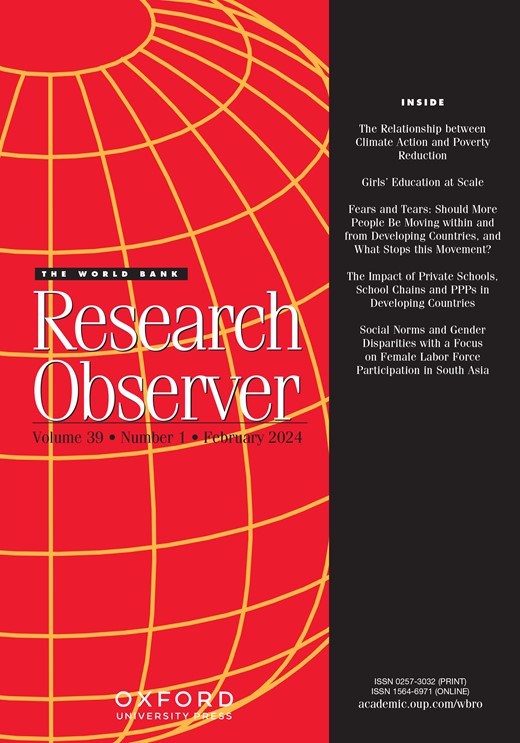恐惧与眼泪:应该有更多的人在发展中国家内部和外部流动吗?是什么阻止了这种流动?
IF 3.3
1区 经济学
Q1 DEVELOPMENT STUDIES
引用次数: 0
摘要
世界上只有七分之一的人口曾经迁移过,尽管通过国际和国内流动可能带来巨大的收入增长。我研究了经济学文献中对这种缺乏流动性的不同解释及其对政策的影响的证据。关于迁移收益的不正确信息,阻碍穷人支付迁移成本的流动性限制,以及由实际运输成本和政策障碍引起的高迁移成本,所有这些都抑制了迁移,并为政策努力提供了空间,以提供信息、提供信贷和降低迁移成本。然而,经济学文献很少关注人们在面对搬到一个新地方的不确定性时的恐惧,以及他们在搬家时流下眼泪背后的原因。虽然这些眼泪揭示了人们对特定地方的依恋,但这种依恋并不是固定的,而是随着迁移经历而变化的。心理因素,如对现状的偏见和无法想象不迁移会放弃什么,可能导致人们不迁移,即使他们可以从迁移中受益,并且不受资金或政策障碍的限制。这为政策干预提供了新的途径,可以帮助个人更好地了解不迁移的机会成本,减轻他们的不确定性,并帮助他们改变不迁移的默认行为。本文章由计算机程序翻译,如有差异,请以英文原文为准。
Fears and Tears: Should More People Be Moving within and from Developing Countries, and What Stops this Movement?
Abstract Only one in seven of the world's population have ever migrated, despite the enormous gains in income possible through international and internal movement. I examine the evidence for different explanations given in the economics literature for this lack of movement and their implications for policy. Incorrect information about the gains to migrating, liquidity constraints that prevent poor people paying the costs of moving, and high costs of movement arising from both physical transportation costs and policy barriers all inhibit movement and offer scope for policy efforts to inform, provide credit, and lower moving costs. However, the economics literature has paid less attention to the fears people have when faced with the uncertainty of moving to a new place, and to the reasons behind the tears they shed when moving. While these tears reveal the attachment people have to particular places, this attachment is not fixed, but itself changes with migration experiences. Psychological factors such as a bias toward the status quo and the inability to picture what one is giving up by not migrating can result in people not moving, even when they would benefit from movement and are not constrained by finances or policy barriers from doing so. This suggests new avenues for policy interventions that can help individuals better visualize the opportunity costs of not moving, alleviate their uncertainties, and help shift their default behavior from not migrating.
求助全文
通过发布文献求助,成功后即可免费获取论文全文。
去求助
来源期刊

World Bank Research Observer
Multiple-
CiteScore
12.60
自引率
1.20%
发文量
8
期刊介绍:
The World Bank Journals, including the Research Observer, boast the largest circulation among economics titles. The Research Observer is distributed freely to over 9,100 subscribers in non-OECD countries. Geared towards informing nonspecialist readers about research within and outside the Bank, it covers areas of economics relevant for development policy. Intended for policymakers, project officers, journalists, and educators, its surveys and overviews require only minimal background in economic analysis. Articles are not sent to referees but are assessed and approved by the Editorial Board, including distinguished economists from outside the Bank. The Observer has around 1,500 subscribers in OECD countries and nearly 10,000 subscribers in developing countries.
 求助内容:
求助内容: 应助结果提醒方式:
应助结果提醒方式:


